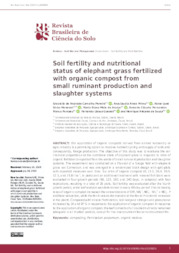Soil fertility and nutritional status of elephant grass fertilized with organic compost from small ruminant production and slaughter systems.
Soil fertility and nutritional status of elephant grass fertilized with organic compost from small ruminant production and slaughter systems.
Author(s): PEREIRA, G. de A. C.; PRIMO, A. A.; MENESES, A. J. G.; ARAÚJO, M. D. M. de; POMPEU, R. C. F. F.; GUEDES, F. L.; SOUZA, H. A. de
Summary: Abstract: The application of organic composts derived from animal husbandry or agro-industry is a promising option to improve nutrient cycling and supply of soils and, consequently, forage production. The objective of this study was to evaluate the soil chemical properties and the nutritional state of elephant grass in response to rates of organic fertilizer composted from the waste of small ruminant production and slaughter systems. The experiment was conducted on a Fluvisol of a forage field with elephant grass var. Cameroon, and was arranged in a randomized block design with split-plots with repeated measures over time. Six rates of organic compost (0, 13.3, 26.6, 39.9, 52.3, and 79.8 t ha-1, in plots) and an additional treatment with mineral fertilizers were evaluated in four growth periods (60, 120, 180, and 240 days, in subplots) with four replications, resulting in a total of 28 plots. Soil fertility was evaluated after the fourth growth period, while leaf analysis was determined in every 60-day period. The increasing rates of organic compost increased the concentrations of OM, NH4+, NO3?, NH4+ + NO3?, P and base saturation, while the H+Al values decreased and the N and P contents increased in the plants. Compared with mineral fertilization, soil inorganic nitrogen and phosphorus increased by 34 and 97 % in response to the application of organic compost. In response to the application of organic compost, the leaf contents of all studied nutrients remained adequate in all studied periods, except for the macronutrient N and micronutrient Mn.
Publication year: 2020
Types of publication: Journal article
Unit: Embrapa Goats & Sheep
Observation
Some of Embrapa's publications are published as ePub files. To read them, use or download one of the following free software options to your computer or mobile device. Android: Google Play Books; IOS: iBooks; Windows and Linux: Calibre.
Access other publications
Access the Agricultural Research Database (BDPA) to consult Embrapa's full library collection and records.
Visit Embrapa Bookstore to purchase books and other publications sold by Embrapa.

